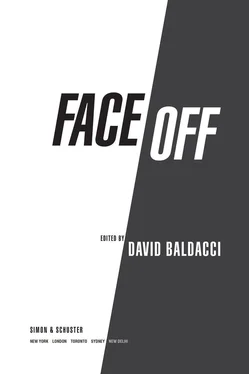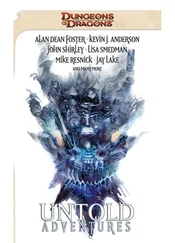David ed. - Face Off (2014) Anthology
Здесь есть возможность читать онлайн «David ed. - Face Off (2014) Anthology» весь текст электронной книги совершенно бесплатно (целиком полную версию без сокращений). В некоторых случаях можно слушать аудио, скачать через торрент в формате fb2 и присутствует краткое содержание. Год выпуска: 2014, ISBN: 2014, Издательство: Simon & Schuster, Жанр: Старинная литература, на английском языке. Описание произведения, (предисловие) а так же отзывы посетителей доступны на портале библиотеки ЛибКат.
- Название:Face Off (2014) Anthology
- Автор:
- Издательство:Simon & Schuster
- Жанр:
- Год:2014
- ISBN:9781476762067
- Рейтинг книги:4 / 5. Голосов: 1
-
Избранное:Добавить в избранное
- Отзывы:
-
Ваша оценка:
- 80
- 1
- 2
- 3
- 4
- 5
Face Off (2014) Anthology: краткое содержание, описание и аннотация
Предлагаем к чтению аннотацию, описание, краткое содержание или предисловие (зависит от того, что написал сам автор книги «Face Off (2014) Anthology»). Если вы не нашли необходимую информацию о книге — напишите в комментариях, мы постараемся отыскать её.
Face Off (2014) Anthology — читать онлайн бесплатно полную книгу (весь текст) целиком
Ниже представлен текст книги, разбитый по страницам. Система сохранения места последней прочитанной страницы, позволяет с удобством читать онлайн бесплатно книгу «Face Off (2014) Anthology», без необходимости каждый раз заново искать на чём Вы остановились. Поставьте закладку, и сможете в любой момент перейти на страницу, на которой закончили чтение.
Интервал:
Закладка:
“Try to relax, Aloysius,” Helen said soothingly. “We know how difficult this must be. You’re awakening from a long, long nightmare. We’re here to help you back to reality. Try to sit up. Have a drink of water.”
Pendergast sat up and Helen adjusted the pillows behind him. He now took a closer look at the room. It was elegant, paneled in oak, with leaded glass windows opening to a sweep of green lawn and flowering dogwood trees. He noted that the windows were discreetly barred. A Persian rug covered much of the gleaming parquet floor. The only indication that this was a hospital room was an odd-looking medical instrument, set into the wall by the head of his bed, with dials, tiny lights, and a series of electrodes dangling on long, colored leads.
His gaze was arrested by a strange sight: in a satin wing chair in the far corner sat a ventriloquist’s dummy. The dummy had brown hair and scarlet lips. It was wearing a doctor’s white coat with a stethoscope draped around its neck. Its mouth hung open, revealing a dark hole. Its glassy blue eyes underneath arched eyebrows stared directly at him, unblinking. It sat up very straight, its legs sticking straight out, its polished brown shoes decorated with painted orange laces.
At that moment, the door opened and a man strode in, a big, cheerful fellow with a fringe of hair around a bald pate. He was dressed in a blue serge suit with a red bow tie, a red carnation in his boutonniere. He carried a clipboard.
Diogenes rose and extended his hand. “Hello, Doctor. We’re so glad you’re here. He’s awake and, I daresay, a lot more lucid than before.”
“Excellent!” said the doctor, turning to Pendergast. “I think we’ve achieved a real breakthrough here.”
“Breakthrough? Not at all. This is some sort of induced hallucination, some scheme to affect my sanity.”
“That,” said the doctor, “is the last gasp of your delusion talking. But that’s quite all right. May I?” He indicated a seat next to the ventriloquist’s dummy.
“I am perfectly indifferent to your comfort,” said Pendergast. “Do as you wish.”
The doctor sat down, unperturbed. “I’m so glad to see you able to recognize Helen and Diogenes. That in itself is a huge step. Before, you couldn’t even see them, so powerful were your fantasies of their being dead. Now, if I may, I’d like to explain all this to you while you’re lucid.”
Pendergast waved a hand.
“Yours is a deep and complex case—perhaps the most complex in my experience. What I am now summarizing is the result of months of painstaking reconstruction. During your time in the Special Forces, twenty years ago, you suffered an unbearably traumatic experience. We’ve covered that thoroughly and don’t need to touch on it again. Suffice it to say, the experience was so dreadful it presented a threat to your sanity, indeed to your very existence. You left the Special Forces. But the trauma produced in you an extreme form of PTSD, which lay deeply buried and untreated. Like a cancer, it worked away on you over the years. Being a man of means, you could afford not to work—and enforced idleness may have been the worst thing for you. You became delusional. Your primary way of dealing with this untreated PTSD was to become, in your own mind, an all-powerful FBI agent, who rights wrongs, kills without mercy, and rids the world of evil. This fantasy took over your very existence.”
Pendergast stared at the doctor. As much as he wanted to disbelieve, there was a disturbing logic to it. As proof, here were Diogenes and Helen, two people he’d believed dead, in the room, living, breathing, and to all his senses absolutely real. He couldn’t deny the reality of his own eyes. And yet . . . his memories of his FBI days, which the earlier litany of Diogenes had opened to him as if by a floodgate, were just as strong.
“You’ve been in a dark place,” the doctor said, tapping his pen on the clipboard. “But you’re making real progress at last, thanks to my course of treatment. In fact, things were looking so promising that, last week, I brought in the two people who care about you the most—your brother and your ex-wife—to be by your side. It’s always darkest just before you emerge from the tunnel.”
“What is this place?”
“This is the Stony Mountain Sanatorium, outside of Saranac Lake in Upstate New York.”
“And how did I get here?”
“Your housekeeper found you barricaded in your Dakota apartment, raving about Nazis. The police were called, your brother was notified, and he and your ex-wife arranged to bring you here. That was almost six months ago. It was slow, difficult going at first, but the progress you’ve made recently is most encouraging. Now—after what I’ve just explained, how do you feel?”
Pendergast turned to Diogenes and was once again struck by the look of brotherly concern on his face. “But you made it your life’s work to destroy me.”
An expression of distress crossed Diogenes’s face. “That, Aloysius, is the most painful part of your delusions. I’ve never been anything to you but a loving brother. Sure, we had our differences as kids. What brothers don’t? But to see those childish tiffs grow into this adult paranoia was really painful. But I love you, brother, and I long ago realized it was an illness—not a choice.”
Pendergast turned to Helen. “And you?”
She lowered her eyes. “First, it was your fantasy about me being killed by a lion in Africa. And then your delusion morphed into something even more bizarre—that I hadn’t been killed by a lion at all, but by Nazis in Mexico. There came a time when I just couldn’t take it. That’s why I divorced you. I’m so sorry. Maybe I should have been stronger. But the fact is I never stopped loving you.”
There was a silence. Pendergast looked around the room. It was all so real, so vivid, and so calming. Despite himself, he felt a sense of release, as if a long nightmare was finally ending. What if they were telling the truth? If so, the horror of Helen’s death hadn’t happened. It was all in his mind. And how wonderful to be released from those dreadful memories, that crushing sense of guilt, pain, and remorse, free of all the horrible things he had witnessed as an FBI agent. And he could let go of the pain of Diogenes’s insanity and implacable hatred. “How do you feel?” Dr. Augustine had asked. He felt at peace. He could forget everything now. It was as if all the shackles of his old, false memories, his old, imagined actions, were dropping away, and he was being given a second chance in life.
“I think I would like to sleep now,” he said.
· · ·
He awoke in the dark. It was night. He sat up and saw Helen, sitting in a chair near the bed, dozing. She awoke, her eyes opening, and smiled. She glanced at her watch. The moonlight was lighting up the lace curtains in the window, casting an ethereal glow over the polished oak walls. The chair with the dummy was now empty.
“What time is it?”
“One o’clock.”
He felt strangely refreshed, alert.
“Would you like me to turn on a light?” she asked.
“No, please. I like the moonlight. Do you remember the full moon?”
“Oh, yes,” she said. “Of course. The moon.”
Pendergast was shaken. He felt a sudden sense of gratitude that she was alive, that she had not died—that he was not responsible.
“What I mean, if I haven’t been in the FBI, what have I been doing?”
“Well, we met after you had left the Special Forces. You never talked about it and I never wanted to pry. You were living a life of leisure and intellectual pursuit at the old family estate down in Louisiana, and we spent quite a few idyllic years there, as well as traveling the world. Tibet, Nepal, Brazil, Africa.”
Читать дальшеИнтервал:
Закладка:
Похожие книги на «Face Off (2014) Anthology»
Представляем Вашему вниманию похожие книги на «Face Off (2014) Anthology» списком для выбора. Мы отобрали схожую по названию и смыслу литературу в надежде предоставить читателям больше вариантов отыскать новые, интересные, ещё непрочитанные произведения.
Обсуждение, отзывы о книге «Face Off (2014) Anthology» и просто собственные мнения читателей. Оставьте ваши комментарии, напишите, что Вы думаете о произведении, его смысле или главных героях. Укажите что конкретно понравилось, а что нет, и почему Вы так считаете.












